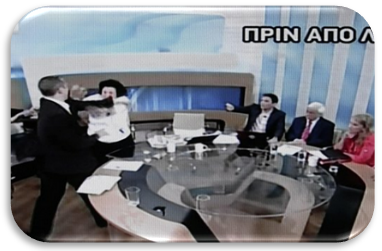 Published: 15 June 2012
Published: 15 June 2012
Region: Worldwide
by Despina Syrri (Symβiosis) & Fred Heritage (MDI)

Political violence on the streets which has been a feature of the Greek crisis in recent months erupted on prime time television on June 7 in an incident which created a global media sensation and at the same time poses fresh questions about how journalists cover the country’s deepening political divide.
Journalists in Greece and around the world were shocked by the actions of a high-profile neo-Nazi MP who assaulted two female politicians from left wing parties on live TV.
But the attack is only the latest incident in a series of organised and targeted acts of violence against specific groups according to their racial or political credentials, undermining Greece’s critical election this weekend.
The televised violence came during a morning talk show when Ilias Kasidiaris, the spokesman of the far-right party Chrysi Avgi (Golden Dawn) after throwing a glass of water at Rena Dourou, a deputy with the radical Syriza party, turned on Liana Kanelli, an MP with the KKE communist party, and slapped her around the face three times as she threw up her arms in self-defence, according to Helen Smith in The Guardian.
Kasidiaris, who was elected to the 300-seat Athens parliament in the country’s inconclusive election last month, appeared in court on Monday accused of aiding and abetting an armed robbery in which a postgraduate student was savagely stabbed in 2007. The extraordinary footage prompted the state prosecutor to order his immediate arrest.
Although Kasidiaris’s denies that Chrysi Avgi is a violent organisation and rejects claims that it has a history of attacks on society’s most vulnerable groups, including the growing population of migrants, the neo-fascist party has refused to condemn his performance on television. By contrast, a spokesman in Greece’s interim government described it as “an attack against every democratic citizen”.
Chrysi Avgi received a stunning electoral result on May 6, when it garnered 6.97 percent of the vote (compared with just 0.29 percent in 2009), after a wave of anti-austerity anger in a nation that has attempted to keep bankruptcy at bay for nearly three years. This incident follows another attack on Gil Shefler, a reporter with the Jerusalem Post who was in
Greece on assignment, by a group masked youths who attacked and beat him with sticks on Tuesday.
Over the last months Greece has seen a wave of racially motivated violence against migrants, particularly in Athens, where migrants have been stabbed in attacks in public spaces, as reported by the media.
 The Kasidiaris incident has prompted anti-fascist protests in Athens and calls for a regenerated nation-wide anti-fascist movement across all areas of Greek society. The Greek population are evidently shocked, and footage of the incident has been replayed repeatedly across the media. People are also asking how Kasidiaris avoided capture by lying low until the expiry of his arrest warrant (in Greece an arrest warrant for a low-level crime expires at midnight the day after the incident)amiidst suspicion of the collaboration between Chrysi Avgi and members of the police force.
The Kasidiaris incident has prompted anti-fascist protests in Athens and calls for a regenerated nation-wide anti-fascist movement across all areas of Greek society. The Greek population are evidently shocked, and footage of the incident has been replayed repeatedly across the media. People are also asking how Kasidiaris avoided capture by lying low until the expiry of his arrest warrant (in Greece an arrest warrant for a low-level crime expires at midnight the day after the incident)amiidst suspicion of the collaboration between Chrysi Avgi and members of the police force.
The party have publicly defended him and an official Chrysi Avgi statement has described the incident as another example of the media’s ‘war of propaganda’ against the party. Kasidiaris justified his actions in an online statement claiming that he ‘did what millions of Greeks would have done – when you get hit in the face you have to defend yourself’.
However, the case illustrates the problems facing media in covering an election that is not just tense, but has a dangerous undercurrent of violence. Journalists and media organisations will be taking extra care to ensure that they do not add to the tinder-box atmosphere by creating on-air confrontation, and certainly they will be wary of giving voice to people who are intent upon incitement to hatred and further violence. For media, the challenge is to restore respect for tolerance and pluralism, even if some of the politicians are determined to behave otherwise.
A few days before another general election, it appears that the fault lines in Greek society are deepening.
Further reading: